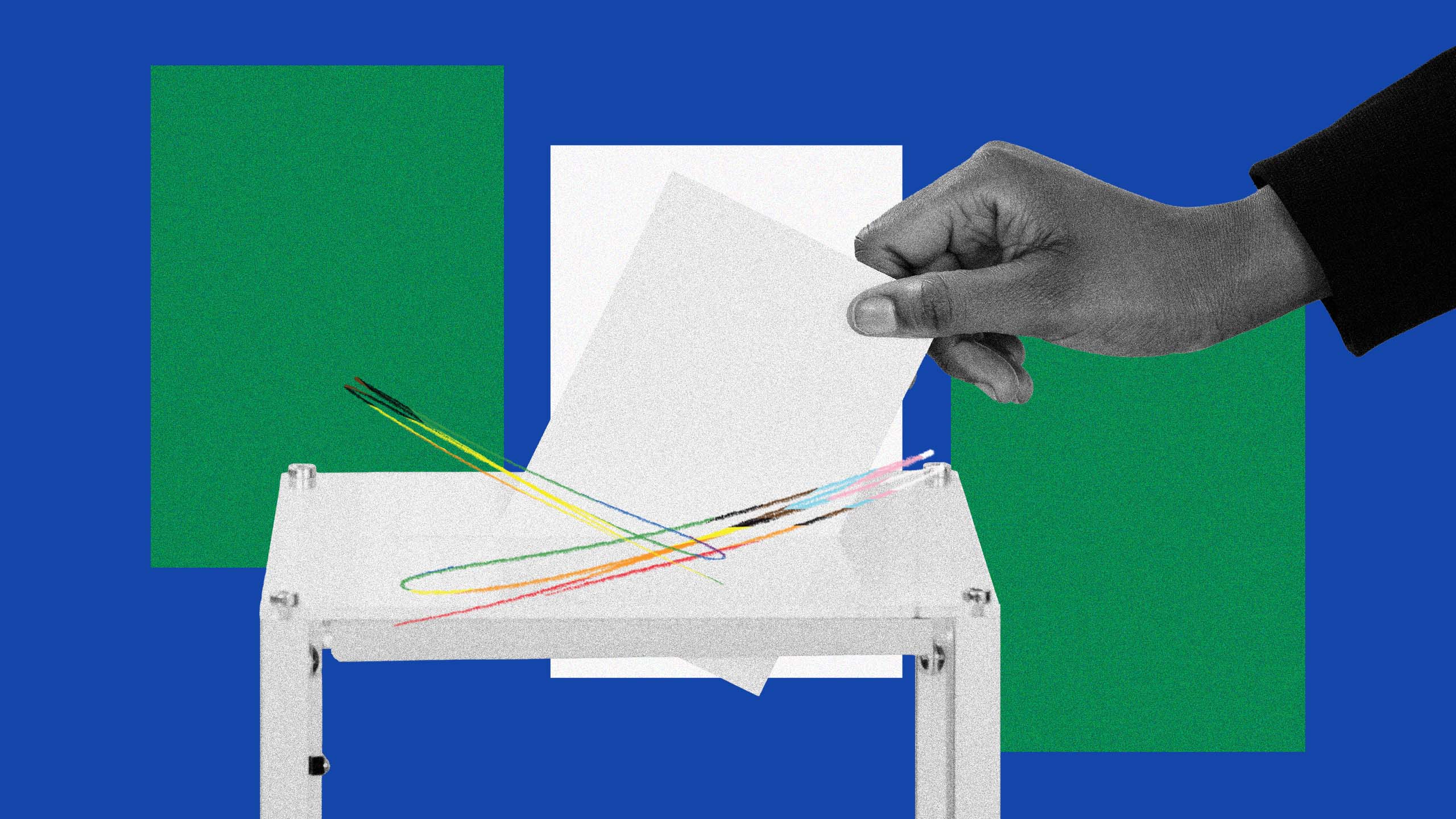Nigeria’s 2023 general elections are slated to be held on Feb. 25, 2023. Citizens are on the edges of their seats, holding their breath in hope as they try [yet again] to make the right decision by electing the right leader, which has been difficult, given the country’s notorious history of bad leadership and corrupt government. Other national problems include strikes from various sectors like education and health, consistent fuel scarcity, jacked-up prices, heavy inflation and decline of the naira [Nigerian currency] and the high level of insecurity and kidnappings, which have plagued the growth of the country.
Nigeria’s presidential election takes place every four years, and citizens share the common goal of wanting to make the right choice for the prosperity and growth of the country, because a lot is at stake, given the last eight years of instability and crises. Within the large demographic of unsatisfied citizens clamouring for a better system, there is the LGBTQ+ community, whose lives were put in even more jeopardy in 2014 during another general election, and through the passing of the Same-Sex Marriage Prohibition Act (SSMPA), which pushed queer citizens further into the margins and denied them security and the opportunity to live freely .
“As always, issues around LGBTQ+ persons are not considered important. If issues that surround my existence as a queer person are not considered important, then it shows that my needs as a Nigerian aren’t respected or considered,” Fisayo Owoyemi, a queer feminist, tells Xtra.
In 2014, then-President Goodluck Ebele Jonathan passed the Same-Sex Marriage Prohibition Act (SSMPA) into law. This act speaks against the marriage and public display of amorous affection between people of the same gender in the country. It further criminalized the lives of Nigerian queer people and made them vulnerable to harassment, extortion, beating and death from both citizens and authorities. According to the Human Rights Watch (HRW), despite existing legislation and the colonial-era criminal and penal code that outlawed consensual same-sex conduct, the passing of the SSMPA was immediately followed by extensive media reports of high levels of violence, including mob attacks and extortion against LGBTQ+ people.
Fast forward to present day: queer Nigerians, having been subjected to numerous inhumane ordeals, are exploring their options for a presidential candidate who could help alleviate the constant homophobia they experience.
“They have divided us up by religion, tribe, region and they define who is a viable candidate and what is a viable political platform. They dictate which rights can be discussed and which ones are laughed off. They decide whose lives are important and who is disposable,” says Ani Kayode Somtochukwu, founder of the Queer Union for Economic and Social Transformation (QUEST9ja) a coalition of radical queer Nigerians fighting to end the economic and social oppression of queer people in Nigeria, in an interview with Xtra.
Within the country, candidates are campaigning to get the people’s vote while promising repairs to the damaged economy.
“I have to add that I don’t think the voice of queer people is separate from the voice of the larger national liberation struggle. Of course, Nigeria is still very queerphobic and there is so much hatred against queer people, but in the end, our destinies are intertwined. Queer Nigerians cannot have freedom unless Nigerians in general are free of oppression. And the rest of the country cannot overthrow oppression unless they abrogate queer oppression along with it,” Somtochukwu says.
In a poll conducted by Bloomberg News in September, with a 72 percent score among those who are likely to vote, Labour Party candidate and former governor of Anambra State, Peter Obi, seems to have garnered the faith of a considerable majority. As campaigns, rallies, interviews and debates and vying for votes took place, all seemed well until a 2014 video of Dr. Yusuf Datti Baba-Ahmed, Obi’s running mate, surfaced on Twitter last July. In the clip, Baba-Ahmad is seen demanding that queer Nigerians be killed as punishment for their queerness.
As expected, this revelation stirred an uproar within the queer community, but, as always, LGBTQ+ people were silenced, with a large number of Twitter users claiming this wasn’t the right time to have such conversations.
“I remember when there was a time on Twitter where there was a conversation around what exactly is Peter Obi doing around LGBTQ+ issues and there was a huge backlash about why we should face more important matters,” Owoyemi says.
Nigeria’s history of silencing the LGBTQ+ community
In 2020, Nigerians came together to protest the violent regime of brutality and senseless killings by the police unit known as the Special Anti-Robbery Squad (SARS). Prior to the protest, the unit was notorious for extrajudicial killings, kidnapping, extortion, harassment and abuse of citizens. The nationwide peaceful protest was staged, calling for the attention of the government and the immediate disbanding of the unit.
The protest caught on like wildfire, and people across major cities like Lagos, Abuja, Port Harcourt and Enugu took to the streets, demanding accountability for lives lost and the disbandment of SARS. The #ENDSARS protest showed the solidarity of Nigerian citizens, and attracted the attention of people around the world. In a bid to highlight the criminalization they face at the hands of security agents, LGBTQ+ people demanded accountability, and for things to be viewed through a lens of intersectionality, using hashtags like #QueerNigerianLivesMatterToo and #EndHomophobiainNigeria. To this, they were met with hostility, reminding them once again that queer safety was not of public concern.
History of homophobia in Nigeria
With heavy cultural and religious biases, Nigeria has been a largely homophobic country even before the passing of the SSMPA. Queer people have experienced constant abuse, neglect, conversion therapy and worse. The SSMPA amplified this hate and prescribed a 10-to-14-year prison sentence for anyone who “registers, operates or participates in gay clubs, societies and organizations” or “supports the activities of such organizations.” With the backing of the law, citizens have been known to take matters into their own hands, and there has been a notable increase in physical violence, aggression, arbitrary detention and harassment of queer people.
The position of queer Nigerians in the upcoming election
Queer Nigerians are often marginalized and used as pawns by political heads to distract citizens from relevant issues. This is not the first time in Nigeria’s history when—in the wake of unprecedented economic struggle ranging from inflation, insecurity and corruption—national focus has shifted to the LGBTQ+ community. Queer Nigerians have taken to social media to air their concerns about having to support a presidential candidate who does not support them.
“A candidate can complain about a Muslim presidential candidate picking a Muslim vice president on grounds of fairness, and then turn around and pick a candidate that has advocated for the execution of queer people as his own vice president,” Somtochukwu says.
Other queer people remain generally uninterested in the election.
“I am mostly not interested, especially because nothing has changed for a lot of queer people in Nigeria. Each candidate, one way or the other, shows that they are not interested in the lives of LGBTQ+ persons in Nigeria,” Owoyemi tells Xtra.
However, as queer Nigerians continue to receive violent backlash for daring to ask about their welfare and safety, they remain unrelenting in their pursuit of justice.
“It still remains important for queer Nigerians to be heard during this election because they are citizens and should be considered. We are the ones who suffer huge backlash, and we are usually the low-hanging fruits whenever politicians feel like they want to sway the masses’ sentiments on things,” says Owoyemi.


 Why you can trust Xtra
Why you can trust Xtra


